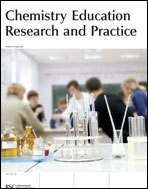PEDAGOGICAL CONTENT KNOWLEDGE AS A WAY FORWARD: APPLIED RESEARCH IN CHEMISTRY EDUCATION
Abstract
As a result of research into students’ understandings, we have lists of student misconceptions, often accompanied by bland statements about preventative or curative actions. We have an enhanced knowledge of the conditions for effective learning, but little guidance as to how this knowledge might be applied to the teaching of particular topics. Research has not had the impact on science teaching that we might have hoped. Furthermore, science education research seems to be looking for direction. Much of chemical education research has used subject matter simply as a vehicle to develop domain-independent pedagogical theory. Commenting on the criteria used for evaluation of teaching, Shulman (1986) asked “Where did the subject matter go?” Perhaps a productive path for us to travel is what Shulman has labelled pedagogical content knowledge (PCK): knowledge about teaching and learning that takes into account the particular learning demands of the subject matter. Science teaching is afflicted with ‘professional amnesia’ in the sense that the understandings that drive the strategies of competent teachers are seldom recorded, so new teachers grow largely through experience. The chemical education enterprise is crying out for ‘applied research’ that probes and documents the topic-specific PCK of respected teachers. Some examples of research findings that support the claims are presented. [Chem. Educ. Res. Pract.: 2004, 5, 215-228]

 Please wait while we load your content...
Please wait while we load your content...